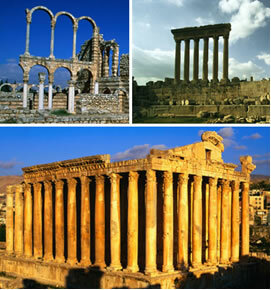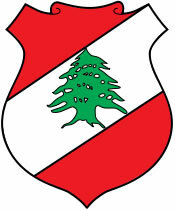A territory that housed the Phoenician Civilization, Lebanon is a link between East and West. Its territory is limited to Israel (to the south), Syria (to the north and east), in addition to being bathed by the Mediterranean Sea (to the west).
Lebanon is a nation of great historical value. In that country is located the Archaeological Site of Baalbek, where are the largest Roman columns, known in a temple dedicated to the god Bacchus.

Baalbek archaeological site
A major confrontation between Christians and Muslims in Lebanon lasted 15 years (1975-1990), a fact that caused destruction and many deaths in Lebanese territory. The reconstruction of the country's infrastructure had the financial help of Germany and France, and, in a few years ago, the national capital, Beirut, returned to its position as the tourist and financial center of the Orient Medium. However, new Israeli attacks in Lebanon, in 2000 and 2006, promoted the devastation of several Lebanese regions, more precisely in Beirut.
These years involved in internal and external conflicts provoked the destabilization of the Lebanese economy, one of the most prosperous in the Middle East. The Gross Domestic Product (GDP) of Lebanon reached the mark of 28.7 billion dollars in 2008. Its composition is as follows: agriculture - 20%; industry - 20%; services - 60%.

Coat of Arms of Lebanon
Data from Lebanon:
Territorial extension: 10,400 km²
Location: Middle East
Capital: Beirut
Climate: Mediterranean
Government: parliamentary republic
Administrative division: 6 governorates
Language: Arabic (official), French, Kurdish, Armenian
Religion: Islam - 59.2%, Christianity - 36.2% (Catholics - 22.6; Protestants - 0.5%; orthodox - 11.1%; others - 2%); no religion and atheism - 4.4%; others - 0.2%
Population: 4,223,553 inhabitants (Men: 2,067,912; Women: 2,155,641)
Ethnic Composition: Lebanese Arabs - 80%, Syrian Arabs - 17.5%, Palestinian Arabs - 1.5%, Kurds and Armenians - 1%
Demographic density: 406 inhab/km²
Average annual population growth rate: 0.8%
Population residing in urban areas: 87.11%
Population residing in rural areas: 12.89%
Illiteracy: 10.4%
Undernourished population: less than 5%
Life expectancy at birth: 71.7 years
Households with access to drinking water: 100%
Currency: Lebanese Pound
Gross Domestic Product (GDP): $28.7 billion
GDP per capita: 6,011 dollars
External relations: World Bank, IMF, UN.
By Wagner de Cerqueira and Francisco
Graduated in Geography
Brazil School Team
countries - geography - Brazil School


